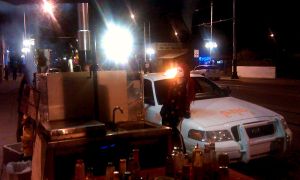Written: December 14, 2014 in Washington, DC
About: November 2, 2014, in Tucson, AZ
My mother called me late at night. My grandmother had passed away. She kept her composure, but the unusual raspness of her voice betrayed the grief. We spoke briefly. She made plans to fly back for the funeral. This was not possible for me.
You always hope that this call would come at a time when you are in a comfortable, safe place. It never does. You are at a birthday party, or eating breakfast, or pumping gas. I was at a laundromat. The phone call left me wiped out and numb, but I had to stay in this place until the spin and dry cycles all finished. It seemed absurd and grotesque that instead of profound, this moment was menial and full of strangers. So it goes.
At least it was in the middle of the night, and I could escape into the empty street for some relief.
A heaving loss was lumbering somewhere beneath the surface of my consciousness, but I could not quite figure out what it was that I had lost. My grandmother had drifted into the fog of Alzheimer’s long ago. Even then, she was left behind that brutal watershed, immigration. In my mind, she had become a fable, and her departure only confirmed her mythological status.
Next morning, compelled by childhood memories, I got up early, went into the kitchen and started cooking. The sun peeked over the roofs and found me with a tall stack of bliny, warmed by the gas stove, as it had often found her. The clouds were turning red and gold, a sight to share with my grandmother. I learned to make bliny by watching my grandmother do it thousands of times.
I have previously been considering going back to Tucson for this year’s All Souls Procession. Now this became an essential, vital need.
***
A mass of humanity – thousands of people – has arranged itself on Tucson’s 6th Street as the desert sun rolled away. It had stoked the afternoon heat, but with the soft darkness drawing upon the city, everything and everyone felt unburdened and refreshed. Filling the streets as a vast flood, we have come for death and remembrance. We have come here not in sorrow, but in unity.
Many carried memories of those who passed away in the last year. Anything from a small pocket photo to costumes to large family gatherings carrying altars adorned with lights and icons. The Urn took up its place at the head of the Procession, filled with letters written to the departed.
Shared sadness turned into great joy. People formed a mad, often bizarre tapestry of costumes, masks, and painted faces. A mesh of music coming from stereos and musicians hung over the gathering. Yet friends still found each other in this chaos. Time passed in smiling conversations, punctuated with excited greetings and hugs. Then by some command, more felt than heard, the crowd shook, the drums kicked up, and we began to move. The sidewalks – the banks of this human river – were packed with onlookers, waving and cheering on those walking.
Somewhere in the thick of it, the pipers of the Tucson Highlanders blew their pipes, lofting that perfect sound of steady hearts and hallowed memories. We followed the thin ghost of their distant sound.
As we followed the pipers, the procession pulled into an underpass beneath a railroad. The entrance into narrow concrete tunnel was ringed with people hanging off the guardrails and the top of the bridge. It was a portal made of humans. The pipers drew themselves up, and launched into Amazing Grace as they descended.
The concrete underworld vibrated and bucked with the power of the music and of the people singing, cheering, whooping, dancing, stomping. The walls beat with our hearts and the lights shined brighter. Sorrow burned and evaporated away, leaving behind only the joy of remembering those we love.
The memories of my grandmother welled up in my chest, too compressed and entangled to pick them apart. Rather, I remembered her, and what it was like to be with her. This feeling pushed out against my bones, burst upward, roaring. I lifted my head and I howled. I howled and I howled I howled, with tears in my eyes, with all the sadness and the longing and the love, until it all emptied out of me, until the pipers led us out of the tunnel, back into this world, back into the crisp night, our river flowing steady between the human banks.
I was in a place removed infinitely far from grandmother. In a foreign country, in a strange desert, a small human in a giant ritual that was unabashedly grotesque and alien. Yet then I was as close to her as I have been in the hot summers of my childhood, on the cool riverbanks, in the green orchards heavy with cherries, in her small kitchen, watching her cook an endless feast for a gang of grandchildren.
Later, in the leery midnight hour, feeling fresh from a monsoon that passed through us, we found a street vendor serving up Sonoran hotdogs, in itself a small tradition. In this safe harbor, we stood around making cheery small talk with the woman while she prepared our food. On the other side of the cart, obscured by a shifting cloud of steam, a beautifully painted Katrina stood leaning on an old cab, another haunt, another apparition.


Recent Comments